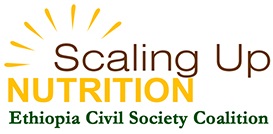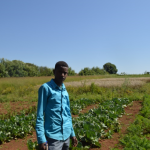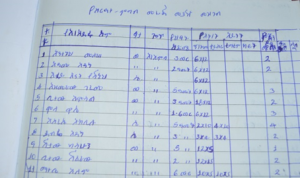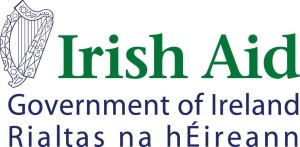Agricultural Intervention for Better Nutrition – West Gojam Experience, Ethiopia
Ethiopia Civil Society Coalition for Scaling up Nutrition
Waleligne Alamayehu, 21, is a young agriculture development agent, who closely lives with and supports rural community in their day-to-day farming related activities at Zallema kebele of Bure woreda, West Gojam zone.

About the authors: This article was documented and shared by Kenaw Gebreselassie and Sosina Melese- Ethiopia Civil Society Coalition for Scaling up Nutrition (ECSC-SUN)].
Waleligne Alamayehu, 21, is a young agriculture development agent, who closely lives with and supports rural community in their day-to-day farming related activities at Zallema kebele of Bure woreda, West Gojam zone.
Since he became a member of the National Nutrition Program-led technical committee established at kebele level and exposed to the knowledge that agriculture is of great contribution to nutrition of children and mothers, Waleligne has been tasked with agricultural activities that improve communities’ nutrition status. “I have begun to see agriculture through nutrition lens and provide the necessary grassroots services to the community,’’ Walelign said.
A testimony for this is his strong commitment to put into action whatever agriculture-nutrition related assignments handed to his position. As a young frontline development worker, he is enthusiastic to support the villagers with whatever intervention nutrition demands from the agriculture sector office he assumes. He uses the kebele level nutrition plan, household visit checklist and other relevant instructions given to him by the Woreda office as guiding documents to direct implementation of nutrition sensitive agriculture in his localities.
Sitting in a very small cell like office at the center of the rural village, Walelign scans through his household visit schedule every morning. He then patrols farmers’ houses, sees their farms and gardens. He prepares a garden patch around his office and grows vegetable and fruits for the community to see and learn how to do the same in their home yard.
Walelign explained how he goes about his work:
A Joint nutrition plan with responsibilities of each sector offices clearly laid out has been rolled out to us from the Woreda (health bureau). A checklist has also been prepared for follow up and supervision of households’ performances regarding nutrition. We prepared nutrition intervention information document where we note down our reports of household visit, which we use as a guide for the next inspection. Creating awareness about the importance of agriculture for better nutrition is on my every day to do list.
And he spelled out some of the changes seen as the result of the agriculture sector intervention at Zallema Kebele:
Before, no household had cared about growing vegetable and keeping chicken in a bid to feed children. Now, with the awareness we are creating, the counselling we give, the motivation we inject, the community in our locality has shown notable changes. We could witness household level gardening and chicken rearing being translated into better nutrition of children and mothers. Availability and accessibility of vegetables and fruits are increasing at family level, and awareness on consumption shows improvement from time to time.
Abiti-Garden and Abiti-Chicken for Better Children’s Nutrition
A small portion of garden (at the backyard of farmers’ house) on which vegetable (and fruits) are grown for children’s feedstuff, and an egg laying chicken exclusively designated for the same child in a household is one of the nutrition sensitive agriculture interventions routinely put into service at Zallema Kebele.
Walelign calls this intervention ‘Abiti-Garden, Abiti-Chicken’ (Abiti is an Amharic term used to call a boy child, here it is used for both – a boy & girl). At Zallema, every household with children under five is required to dedicate a small plot of garden and an egg laying chicken to a child. Whatever the garden yields goes to the child’s feedstuff; whatever the chicken gives also the same.
Almost all households with children under five prepare a garden at their backyard and keep egg producing chicken for children’s feeding. Whatever is obtained from Abiti’s Garden and Abiti’s Chicken is used solely to feed children unless there are excess products that might perish if not sold. Consequently, the feeding habits of children in the kebele have changed compared to the previous time when children had not been privileged to eat animal products, vegetables, and fruits. This and other nutrition sensitive interventions help increase availability of variety of food not only for children but also for the whole family, Walelign proudly spoke of.
The agriculture office at Zallema rural kebele incorporates nutrition components in its routine monitoring checklist. Abiti Garden and Abiti Chicken plainly stand out on the checklist of the household follow up. As the agriculture development workers patrol to the households once in a week, they inquire whether the family has both: the garden and the Chicken.
“I check on if every household designates a garden and keep chicken for the kids’ vegetable and eggs consumption. We find this very inspiring and encouraging that other localities should follow suit. I am happily doing this job as I see positive changes every day,’’ Walelign said.
This local success of nutrition sensitive agriculture practice should be scaled up so several other localities could benefit from the positive impacts that agriculture has on nutrition of children and mothers.
The Ethiopian Civil Society Coalition (ECSC) was established in 2013 in order to galvanise efforts to alleviate the burden of malnutrition. The ECSC-SUN is chaired by Save the Children and funded by IrishAid.




